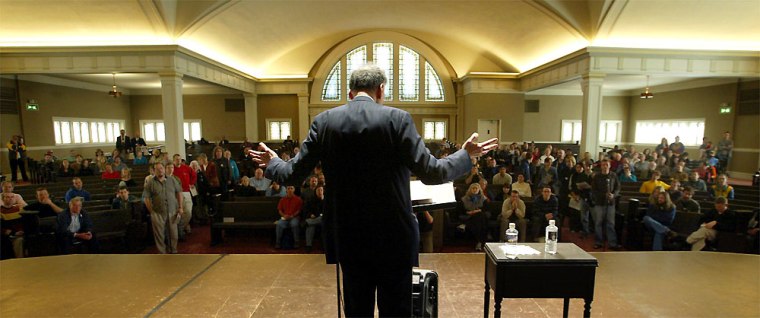How worried are democrats that Ralph Nader will once again tip the election to the GOP? Just ask Jason Salzman. The liberal Colorado Democrat, a Nader backer in 2000, has founded a Web site, Repentantnadervoter.com, where 1,500 one-time Nader supporters have pledged to vote for the candidate "most likely to defeat" President Bush in November. Salzman, 41, still believes Nader is right on the issues — but vows to "persuade others to not repeat the same mistake."
Democrats from Salzman to Presidential contender John Kerry have good reason to worry. Despite President Bush's sagging job-approval numbers, polls continue to show a close contest nationally. If the election were held today, Kerry would edge out Bush 49 percent to 47 percent in a two-way race, according to Democratic pollster Stanley B. Greenberg. But in a three-way contest, Kerry's lead would shrink to 46 percent vs. Bush's 45 percent, with Nader clinging to a small but growing 6 percent slice of the electorate. Nader's steadfast opposition to the Bush Administration's Iraq policy is especially appealing to left-leaning independents who are wary of Kerry's support for the war. "Nader is a genuine threat," warns Greenberg.
The Kerry campaign is taking that threat seriously. To slow Nader's momentum, Kerry took a two-day swing through Oregon with former rival Howard Dean, the antiwar champion of Democratic liberals. Kerry also met with Nader on May 19 in hopes of persuading the consumer activist that his efforts are jeopardizing the fight to defeat Bush. And to bolster those efforts, several Democratic campaign veterans have formed an independent group to run anti-Nader ads in key states.
Whatever national polls show, Democrats know it's the state-by-state tally that really counts. And although state polls, which are taken less frequently, may not yet reflect growing voter dismay over the latest bad news from Iraq, they do point to danger signs for Kerry. Recent polls show Nader diverting votes from Kerry in 17 closely contested battlegrounds. Even in some states where Nader is polling just 2 percent or 3 percent of the vote, he could decide another photo finish. Among the states where Nader could do the most damage to the Dems: Florida, Iowa, Michigan, New Hampshire, New Mexico, Oregon, Pennsylvania, and West Virginia.
Sunshine state gloom
In Florida, for example, Nader's presence on the ballot could once again tip the pivotal state to Bush. In an American Research Group Inc. poll taken April 18-21, Bush held a 46 percent to 45 percent lead over Kerry, with Nader receiving just 3 percent. But those are votes that would otherwise go to Kerry. That has the Dems nervous about a repeat of 2000, when Vice-President Al Gore lost Florida by just 537 votes after Nader received 97,488 votes. West Virginia, an historically Democratic state that Bush captured in 2000, could also turn on the Nader vote: An ARG poll taken March 23 showed Bush and Kerry dead even at 46 percent, with Nader's 2 percent drawing twice as many Democratic votes as Republican.
In another six swing states, polls show Nader winning at least 5 percent of the vote. That's enough to make the race close in Kerry-leaning New Jersey, Oregon, Pennsylvania, and Wisconsin. Tight contests in Arizona and Arkansas could also tilt toward Bush. In Arizona, Bush led Kerry by four percentage points in a one-on-one matchup. But with Nader figured in, drawing 7 percent in a three-way contest, the President's lead doubled to eight percentage points, 45 percent to 37 percent, according to an April 29-May 4 Rocky Mountain Poll.
Nader argues that his allure isn't exclusive to liberal independents: He says he's peeling off Bush supporters as well. His economic nationalism does appeal to some conservatives. Nader recently gained the endorsement of the Reform Party, home of Ross Perot and Patrick Buchanan. The endorsement also qualifies him for the ballot in seven states, including Florida.
Even so, Nader's draw is clearly highest among the left-leaning independents who strongly oppose Bush's Iraq policy. A survey by the University of Minnesota's 2004 Elections Project shows that 11 percent of independents favor Nader. If he left the race, most could be expected to shift their support to Kerry. "Both Kerry and Bush are fishing in the same pond," says University of Minnesota political scientist Lawrence R. Jacobs. "It's not helpful to Kerry to have this other hook in the water."
Nader dismisses the hand-wringing by Democrats over his candidacy. If Kerry wants to harvest his votes, says Nader, Kerry should stop trying to imitate Bush and adopt his liberal agenda instead. "If the Democrats don't quit whining and carping, they won't even be able to win back the Democrats who voted for Bush last time," Nader says. "They can choose to become a better party or just stay the least worst."
Nader's support among Democrats may well fade in the home stretch. When they enter the voting booth, people frequently abandon independent candidates. But Nader proved in 2000 that even a few votes in close races can be crucial. The last Presidential election may seem long ago, but Kerry can't rule out a sequel this November in which Ralph Nader once again plays an outsize role.
